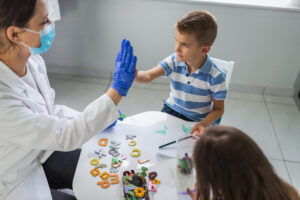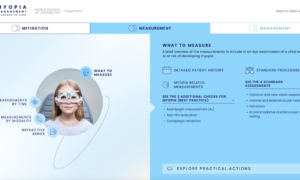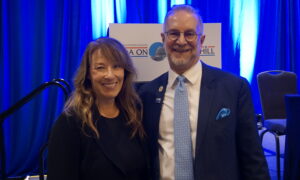February 1, 2024
By Vittorio Mena, OD, MS
Following the school nurse’s evaluation, it is up to the parents to find an eye care practitioner to get a comprehensive eye examination for their child. The only problem is that statistics show that 67% of students who fail a vision screening do not go and get an eye exam.
Of our five senses, the last one anybody would want to lose is their vision. Ironically, though, it tends to be the last thing people think about, especially regarding children. The dental industry has it down pat, where many patients return for their six-month follow up visits. Yet, for eye exams, it is like “pulling teeth” getting patients to come every year, or even less frequently when their insurance tells them to come back in two years.
When it comes to school nurses and the public, they typically hear about the American Dental Association (ADA) because of the countless toothpaste commercials on TV and social media, but when it comes to the American Optometric Association (AOA), that’s not the case. Because of this, I go out of my way to talk to school nurses about what the AOA is and the resources that are available to the public.
The AOA Research and Information Committee conducted a survey in May 2022, and there are some interesting highlights from the 464 optometrists who participated. Ultimately, 69% of the respondent’s report providing myopia management services in their practice, and 75% consider myopia a disease in need of treatment. Additionally, 33% of myopia management candidates defer treatment, and 80% of these patients postpone therapy because of costs.
A Nurse’s Role
For school nurses across the country, they will perform vision screenings for all the students within the school. When a student fails a screening, indicating a vision problem, they will write up a form with the findings and send a note home to the child’s parent or guardian. Some school nurses have the luxury of having a hand-held autorefractor or spot screener, but this is not considered the norm. All schools have access to the Commission for the Blind, and some schools are partnered with Head Start programs for vision evaluations. However, many times these children do not receive glasses.
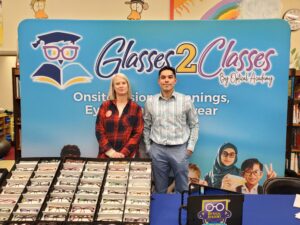
Dr. Mena and school nurse Mrs. Sutton-Parris, who works at an elementary school in Salem County, New Jersey. Mrs. Sutton-Parris said that Optical Academy’s Glasses 2 Classes program “was the best experience for students at her school.”
Following the school nurse’s evaluation, it is up to the parents to find an eye care practitioner to get a comprehensive eye examination for their child. The only problem is that statistics show that 67% of students who fail a vision screening do not go and get an eye exam.1
Access to Eye Care
One major problem is the fact that there are few pediatric optometrists or ophthalmologists. I practice in New Jersey, and if you are in a rural part of the state, you may not have a pediatric eye doctor within one hour of your home. If you are in a more rural state in the middle of the U.S., you may have a pediatric eye doctor who is three or four hours away, if not further.
A second issue arises with insurance plans. When parents have Medicaid or a similar plan, a practice might not accept it. Families may otherwise be unable to afford an eye exam visit, or they simply can’t afford the cost of the glasses. Or, if the practice does accept Medicaid, they don’t see patients under the age of 6, or even sometimes under the age of 10.
Another concern is timing, where parents, or a single parent, can’t find time in their schedule to take the child for an eye exam, either because they work multiple jobs, or the eye care office is too far away, or the practice might be booked out for three to four months before they can get an appointment. Other times, parents might not believe the vision screening results about their child, choosing to believe their child’s eyesight is fine. Because of these issues, parents will typically take their child to the pediatrician, and whatever the pediatrician says about their child’s vision is considered golden.
Working with School Nurses
As a representative of Optical Academy, which partners with the New Jersey Education Association (NJEA), I have the opportunity to go into schools to provide eye care. I have personally been to over 750 schools across the state. We provide on-site eye examinations, as well as distribute glasses with prescriptions, to students who need them. We can also provide follow-up care to those who need keratoconus evaluations, vision therapy, or myopia management.
Since I get to travel throughout the state, it is sometimes difficult for parents to bring their child to our office. I will work with school nurses to make sure they have recommendations for optometrists in their area who specialize in myopia management. For students who are close to our office, we will have them come back to provide additional care.
According to the AOA survey, the top three choices for myopia management treatment were FDA-approved soft multifocal contact lenses, off-label soft multifocal contact lenses, and low-dose atropine. Orthokeratology and progressive spectacle lenses rounded out the top five. You always need to discuss the pros and cons of each treatment, the costs involved (materials and professional fees), and the expectations for treatment. I try to get all my patients in contact lenses because I know when I go into schools, children will lose or break their glasses, or not wear them. By having contact lenses on all day, they will get the best outcome I am looking for. Remember: as optometrists, we need to be on the frontlines of this disease because every diopter matters!
For any doctors interested in providing care to schools in your state, please feel free to contact me or Optical Academy by visiting the website for more information.
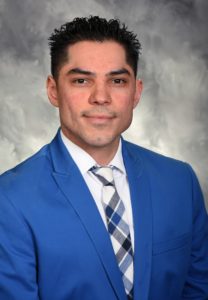 |
Dr. Vittorio Mena works as the Sports Vision Director at Optical Academy in Clifton, New Jersey, and works alongside the New Jersey Education Association. He also serves as an Advanced Clinical Director for the Special Olympics Lions Club International Opening Eyes program for the state of New Jersey. Dr. Mena is also on the Board of Directors of NJSOP and is a Board Member of the AOA Sports Performance Vision Section. To contact Dr. Mena, email him at Menavitt@gmail.com |
References:
- Lazarus, R. Are School Vision Screenings Reliable? https://www.optometrists.org/childrens-vision/vision-for-school/are-school-vision-screenings-effective/#:~:text=It%20has%20been%20estimated%20that,care%20from%20an%20eye%20doctor.


